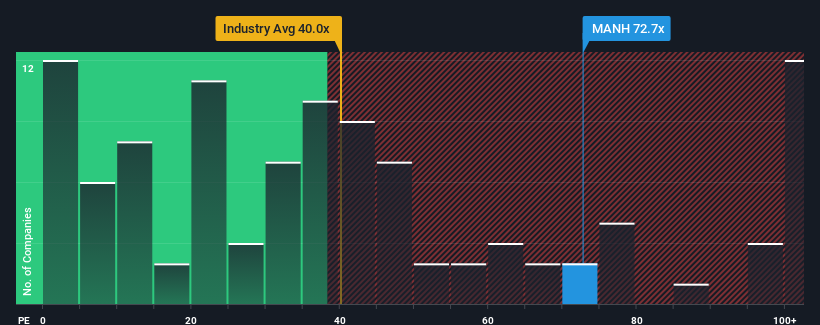- United States
- /
- Software
- /
- NasdaqGS:MANH
Risks To Shareholder Returns Are Elevated At These Prices For Manhattan Associates, Inc. (NASDAQ:MANH)

With a price-to-earnings (or "P/E") ratio of 72.7x Manhattan Associates, Inc. (NASDAQ:MANH) may be sending very bearish signals at the moment, given that almost half of all companies in the United States have P/E ratios under 16x and even P/E's lower than 9x are not unusual. However, the P/E might be quite high for a reason and it requires further investigation to determine if it's justified.
Manhattan Associates certainly has been doing a good job lately as its earnings growth has been positive while most other companies have been seeing their earnings go backwards. It seems that many are expecting the company to continue defying the broader market adversity, which has increased investors’ willingness to pay up for the stock. If not, then existing shareholders might be a little nervous about the viability of the share price.
See our latest analysis for Manhattan Associates

What Are Growth Metrics Telling Us About The High P/E?
Manhattan Associates' P/E ratio would be typical for a company that's expected to deliver very strong growth, and importantly, perform much better than the market.
If we review the last year of earnings growth, the company posted a terrific increase of 42%. The latest three year period has also seen an excellent 126% overall rise in EPS, aided by its short-term performance. Therefore, it's fair to say the earnings growth recently has been superb for the company.
Turning to the outlook, the next three years should generate growth of 11% per annum as estimated by the eleven analysts watching the company. That's shaping up to be similar to the 10% each year growth forecast for the broader market.
In light of this, it's curious that Manhattan Associates' P/E sits above the majority of other companies. It seems most investors are ignoring the fairly average growth expectations and are willing to pay up for exposure to the stock. These shareholders may be setting themselves up for disappointment if the P/E falls to levels more in line with the growth outlook.
The Final Word
Typically, we'd caution against reading too much into price-to-earnings ratios when settling on investment decisions, though it can reveal plenty about what other market participants think about the company.
We've established that Manhattan Associates currently trades on a higher than expected P/E since its forecast growth is only in line with the wider market. When we see an average earnings outlook with market-like growth, we suspect the share price is at risk of declining, sending the high P/E lower. This places shareholders' investments at risk and potential investors in danger of paying an unnecessary premium.
A lot of potential risks can sit within a company's balance sheet. Our free balance sheet analysis for Manhattan Associates with six simple checks will allow you to discover any risks that could be an issue.
Of course, you might also be able to find a better stock than Manhattan Associates. So you may wish to see this free collection of other companies that have reasonable P/E ratios and have grown earnings strongly.
New: Manage All Your Stock Portfolios in One Place
We've created the ultimate portfolio companion for stock investors, and it's free.
• Connect an unlimited number of Portfolios and see your total in one currency
• Be alerted to new Warning Signs or Risks via email or mobile
• Track the Fair Value of your stocks
Have feedback on this article? Concerned about the content? Get in touch with us directly. Alternatively, email editorial-team (at) simplywallst.com.
This article by Simply Wall St is general in nature. We provide commentary based on historical data and analyst forecasts only using an unbiased methodology and our articles are not intended to be financial advice. It does not constitute a recommendation to buy or sell any stock, and does not take account of your objectives, or your financial situation. We aim to bring you long-term focused analysis driven by fundamental data. Note that our analysis may not factor in the latest price-sensitive company announcements or qualitative material. Simply Wall St has no position in any stocks mentioned.
About NasdaqGS:MANH
Manhattan Associates
Develops, sells, deploys, services, and maintains software solutions to manage supply chains, inventory, and omni-channel operations.
Flawless balance sheet with proven track record.
Similar Companies
Market Insights
Community Narratives



